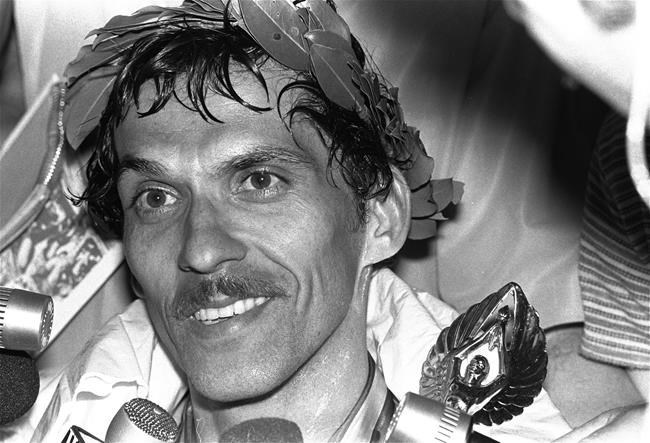TORONTO — Jerome Drayton wasn't surprised that Cam Levins was the runner who finally took down his 43-year-old Canadian marathon record.
Drayton has followed Levins' progress over the years and felt he had the ability to break his long-standing mark of two hours 10 minutes nine seconds.
"I knew that he had a very fast 5,000 and 10,000-metre background and that's what you need to be a high-quality marathoner," Drayton said Tuesday from his west-end Toronto home. "So I'm not surprised he got it."
Levins broke the record in the 42.195-kilometre race last Sunday at the Toronto Scotiabank Waterfront Marathon. His time of 2:09.25 trimmed a whopping 44 seconds from Drayton's record.
"I think it's about time the record was (broken)," Drayton said. "I think it should have (happened) about 30 or 40 years ago but then I guess the quality of marathon runners wasn't that great in those years."
Levins achieved the feat despite temperatures that hovered near the freezing mark and some fairly stiff winds. It was the marathon debut for the 29-year-old from Black Creek, B.C., who earned a bonus of $43,000 for breaking the record.
Levins primarily focused on 5K and 10K distances before an ankle injury in 2015 required surgery, sidelining him for most of the next two seasons. He raced at the 2012 London Olympics and won bronze in the 10K at the 2014 Commonwealth Games.
Drayton said he's planning to chat with Levins once he returns from vacation.
Now 73, Drayton set the previous record in Fukuoka, Japan in December 1975. He finished sixth in the Olympic marathon the following year at the Montreal Games and won the Boston Marathon in 1977.
Drayton said he first broke the national mark in 1968, did it twice in '69 and again in '70 before the eventual standard was set five years later.
"I was the only one capable of breaking my own record," he said.
In that era, the Japan race was considered the unofficial world championship. Drayton was victorious there on three occasions.
"Boston, in my years, it wasn't really that high quality," he said. "There were only two or three runners that I'd have to worry about in terms of competition. But in Japan, it was usually anywhere from up to about 20 including the Japanese. It was very high quality in those days."
His '75 victory came despite a significant shoe problem late in the race. Drayton said an arch support became "totally unglued" and moved under his toes.
"I was in first place at the time and I had to slow down to try to work it back in, which obviously I couldn't do with my toes," he said. "The guy who was in second place, he passed me, and I remember he had a smile on his face. I guess he figured I must have hit the marathon wall. So he took the lead and after about a minute or so, I noticed he wasn't increasing the distance between him and myself. I think he was maybe 25 or 50 yards ahead of me.
"So I finally had to ignore the arch support and leave it underneath my toes and I just went after him. I managed to get him with about a half-mile to go."
Drayton's foot was stiff for "about a week" afterwards.
"I must have lost about 30 seconds," he said. "I could have been in the 2:09:30-something range."
A native of Kolbermoor, Germany, Drayton first got into running as a high-school student.
"I think I may have tried to impress a girl, try to win her away from somebody else," he said. "That didn't work but I sort of figured at least I got an 18-year athletic career out of it. I loved the winning and I loved the running part."
Drayton would devour library books during his formative years in the sport to soak up as much information as he could to improve.
"Anything to do with health and fitness — I would read and make notes for myself," he said. "Anything to do with training. If there was something new, then I would build it into my training program. You have to get to your know your own body. It's not enough to just know the body in general. As it related to running and nutrition, you eventually have to get to know yourself what your needs are."
The biggest difference in the sport between then and now, Drayton feels, is the improved training methods.
Like Levins, Drayton excelled at shorter distances before eventually taking on the marathon. He had his eye on trying to make the Canadian team at the 1968 Mexico City Olympics when he ran his first marathon in Detroit.
Drayton slowed down over the last few kilometres but still made the Olympic standard by three seconds.
"Trying to explain the agony of a first marathon is like trying to explain colour to someone who is born blind," he said.
Since there was little money to be made, Drayton juggled a full-time work schedule with his training. He would start running at 5:30 a.m. before his workday began and then hit the road again in the early evening, logging up to 300 kilometres some weeks depending on his routine and the time of year.
"An athletic career was considered to be a serious hobby instead of a profession," he said.
Hamilton's Reid Coolsaet, who finished 10th on Sunday, had previously been the closest to breaking Drayton's record. He was about 20 seconds shy of the mark at a 2015 race in Berlin.
Kenya's Benson Kipruto won gold in 2:07:24. Levins was fourth overall.
———
Follow @GregoryStrongCP on Twitter.
Gregory Strong, The Canadian Press



